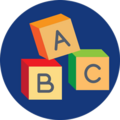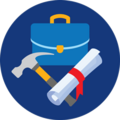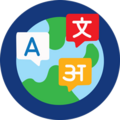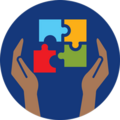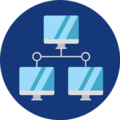In this episode, Wayne RESA Career Counselors Brad Minton, Tanji Lilly, and Chris Ferrell discuss how the Ready to Launch program assists local districts and students (and their parents!) by accelerating students' exposure to career resources by working with individuals and small groups and providing individual action plans. The counselors provide resources that help students explore career interests, expose them to careers they had not thought about before, pathways to achieving career goals, and opportunities for internships and financial assistance.
Length - 27 minutes
Music by Wataboi from Pixabay
Resources
Resources From Wayne RESA
Wayne RESA Workforce Development
Steps to Career Success
Career Planning Tips and Tools for Students
Career Exploration Resources
Going Pro - To elevate the perception of professional trades and showcase the opportunities in a variety of rewarding careers, Going PRO in Michigan was created. For generations, these types of careers have been treated as inferior. But now, it is time to level the playing field.
Pure Michigan Talent Connect - Pure Michigan Talent Connect is your launch pad for new jobs, careers and talent. It is a tool connecting Michigan’s job seekers and employers, and serves as a central hub linking all public and private stakeholders who support Michigan’s workforce. Pure Michigan Talent Connect serves as the state’s labor exchange system.
Virtual Job Shadow - empowers individuals to discover, plan and pursue their dreams with our unique video-based career planning platform. Our interactive tools help students and job seekers develop career paths based on choice, not chance.
DTMB - Michigan's Hot 50 - Job outlook forecasts for the state through 2032.
Career Exploration Platforms
Note: these are subscription services; not for individual use. Contact your school to see if they subscribe.
Transcript
Brad Minton: Hello, and welcome to another episode of Getting to the Core. I am going to be your host for this particular episode. My name is Brad Minton. I’m a post-secondary success navigator here with Wayne RESA. My role here is about providing navigational support and resources to the recent graduates of the Ready to Launch Program. Our episode today is actually about highlighting the incredible work of the career counselors who make this important initiative a success for so many students across Wayne County.
So, I wanted to take a minute to introduce two of our seven incredible career counselors that we have working in the Ready to Launch Program. We have today with us on podcast Tanji Lilly and Chris Ferrell. Tanji Lilly is serving and her fourth year as a Wayne RESA Ready to Launch career counselor. After transitioning out of public relations Tanji has served almost 12 years in education. Having the privilege of connecting students to hope and opportunities has been the best part of her current and past positions. She's currently working with students in Wayne Westland, South Redford, Taylor, and Detroit Public Schools.
Chris Ferrell has worked for Livonia Public Schools for 23 years. He started his career at Stevenson High School as a marketing educator and co-op coordinator. He has over 15 years of school counseling experience from Frost Middle school, and most recently at Franklin High School. He now serves as the career counselor with Wayne RESA’s Ready to Launch program, serving the students serving the students of Northville, Wyandotte, Annapolis, Lincoln Park, and Redford Union. So, first of all, Chris and Tanji, welcome to the podcast.
Tanji Lilly: Thank you for having us.
Chris Ferrell: Thank you.
Brad Minton: So, one of the things that people who are listening to the episode today might be wondering, is what is the Ready to Launch program and what kind of work, do you do? So,
Chris, I’ll go ahead and start with you. Can you provide us a little overview of the Ready to Launch program and some of the services that you provide for students across Wayne County?
Chris Ferrell: Yeah, absolutely. Thank you for having us. So, we provide a variety of services in our program. We meet with students one-on-one to discuss their interest in future careers and next steps after graduation. We will sometimes do small and large group presentations on those topics as well.
Brad Minton: Fantastic. Tanji, was there anything in addition to what Chris had mentioned in terms of services that you offer?
Tanji Lilly: No, I mean, that's it. I mean, I just always would like to bring up that we get to work with some amazing counseling teams across the county. And so, that's kind of one of the highlights of this work: just seeing the way the different teams function. And then, just being invited in and having the privilege of working with those students. So, like he mentioned, the one-on-ones, the group sessions…we also, you know, last year, like everybody else, we converted and did some adapting and so we have some virtual offerings now. So, just being able to connect those students opportunities, get them out of the building sometimes. So that was always nice when we could get them into different industries, let them see those careers at work. So, we just really try to expand their career awareness and connect them to opportunities and like I said, hope. That's huge.
Brad Minton: I love that. So, one of the things that people might be wondering as they're listening to, really, some of the incredible things that you're doing with this program is how students are getting in front of you in the first place? How they're actually referred to you? So, whoever would like to kind of dive in and take that one; how can students get connected with you and have access to this?
Tanji Lilly: So, what we've done is if we're in a building, it’s data driven. So, we might do our presentation and then as students complete a survey from there, the entire counseling team is looking at the survey and kind of figuring out which kids might need the resources of an additional Ready to Launch counselor. Some students will self-refer. So, if they find out they have a career counselor in the building, and they see a flyer with your, you know, name, phone number, or a QR code, they'll just, you know, request an appointment. We've had students attend our career chats, whether they were in our buildings or they just found out about the chats elsewhere. And we give them our contact information there and then they just reach out, you know; once we share the resources or they just reach out before we send the resources, just because they'd like to talk more about what they're thinking. Chris, you want to add something?
Chris Ferrell: Yeah, I think you I think you really covered it all. I mean, we primarily work with graduating seniors but we're finding that since the program has been around for about five years now, we're ready to, sort of, spread the wealth, if you will, and start working with, you know, juniors and underclassmen. And so, depending on our time and how that looks throughout the school year will be meeting with juniors and that might be in a small or large group presentation style.
Tanji Lilly: I’ve had some great sessions with ninth and 10th graders, just really, like, you know, we convert it. So, we make it more fun. We might do a game where they're naming careers and a pathway using some of the, you know, top in-demand career resources and everything. So yeah, definitely try to support what the counseling team in a district is already working on.
So, if they're encouraging Xello or Naviance, then I will lean right in to support that. But, definitely encouraging them to do their best academically, because then all of these different career options will be available to you. So yeah, really enjoy being able to get into those 9th and 10th grade presentations and classrooms, and juniors as well.
Brad Minton: One of the things that I appreciate so much about what you're talking about is just having this really great adaptability, and being able to partner with those counseling teams to be able to recognize what they're already doing to be a support for them, and, you know, find a way to integrate what you have to offer into those existing services, and I think that's great. One of the things that you did mention, Tanji, was about resources. I was hoping you could maybe highlight a couple of the main resources or tools that you will provide students in your work.
Tanji Lilly: Yeah, of course. So, if a district has invested in something, I definitely want to support that first. I mean, because when we choose a particular program, you know, they're not free. So, if they're using Xello, if they're using Naviance, if they're using Career Cruising, etc., then I definitely work with the counseling team to figure out what they're suggesting first, if there's any modules they really want them to achieve. And then I try to increase the relevance for the students, because sometimes the students are thinking, “Oh, this is just busy work… they're making us do it.” I’m like, “Oh no, this is an amazing resource. So, let's look at Xello right now. Let's look at, you know, all these different career videos.” What you guys tend to like to do is to scroll down to the job you were already considering, and what I’m encouraging you to do is expand your career vocabulary today, and look at 10 jobs you had no idea might be of interest to you. So, definitely supporting what the districts are doing first. One of my go-tos is always Going Pro. So, we do spend a lot of time talking about the trades; I love what they've done with the site and so I’m a hands on person; I’m a visual person. I love to see people doing the work, and so I think that, you know, a lot of the kids benefit from that. If any of the colleges have videos or really distinct programs that I will definitely take a student to that program page and walk them through. So, if a student says, “I’m interested in X at this place,” one of the first things I’m doing is taking them to that resource, because a lot of times they haven't actually done it. So, I’m taking them to the resource and as a counselor now, I’m watching them to see how they're responding to the information. So, I’m saying, “Okay, you're saying you're interested in this. Let's talk about these classes, how do you feel?” So, I’m looking for eyebrows furrowing or like confused faces, and as a counselor I’m now trying to get a sense of, “Hmm…you don't really seem to be loving all these classes. Are you sure you really wanted this, or are we looking for something a little bit more hands on?”
So, I’ll always use the college resources, MI Talent, Pure Michigan Talent Connect… So, I definitely want to show them where the career opportunities are. So, if it's something that's going to be…won't have a lot of jobs, I like for them to see that in real time and not to discourage them, but to help them understand that they're going to need to be really driven; that they're going to need to look for internships, apprenticeships, start volunteering in those industries… something to make them set themselves apart so Pure Michigan Talent Connect, Going Pro, whatever career resource the school is already using, Virtual Job Shadow and a few others…Own It… like there's some great ones out there.
Brad Minton: I really, really love that you outline so many of these different resources, but also really kind of talked about the psychology behind it and really you know just kind of taking an inventory of how students are responding to the different resources and again adapting to what you're seeing in real time. And, you know, one element to what you just said that I thought was really, really important was about exposure and about you know getting students exposed to things that have been out of their awareness that they didn't know existed. You know, we talk a lot about the skilled trades and how so many students just do not understand all the range of different opportunities that are available in the skilled trades across Wayne County. You know, Chris, I was hoping you could kind of talk a little bit about some of these areas where students can really get exposed to these opportunities that that maybe extends beyond simply, you know, a computer screen.
Chris Ferrell: Yeah, absolutely. One of the things I wanted to point out, when we were talking about resources is just the amount of resources, we as a department and team have put together. And so, in our own work we've been able to sort of curate, sort of, the best of, if you will, informational resources and be able to share that in a really easy user-friendly way. You know, we learned so much from being remote for last year that we really had to take a lot of the handouts and things that we would normally share with students and families and really adapt them and put them into a way that we could share them with them remotely. And many of us have websites, individual websites, that we use. We have a website that the department uses, which is great as well. So, I’m just really proud that we were able to adapt to a challenge, very challenging situation that, you know, we were all sort of going through last year. But as far as career exposure goes, you know, we provide a quarterly newsletter that we share with all of our schools throughout Wayne County. And that gives an opportunity for parents and students to see all the events that are occurring in their area. One of them that is new to us this year is the parent information series. And so, one of the things we found as career counselors was in talking with students, there was a disconnect between what the students knew or didn't know and how they communicated that information to their parents. And so, a few of the career counselors got together and decided we need to do some education for parents. And so, we've put together a series to assist parents in offering them resources so that they can help their student as they're going through this this career journey. And it may have been mentioned before, and Tanji has done an amazing job, we've had a variety of virtual career chats. And so, we've been able to basically bring industry experts people who work in a variety of fields together on a Zoom call and then have students and, in some cases, parents listen to what these experts have to say. And so, it's a great opportunity for a variety of students to get information about these career areas that they might be interested in.
Brad Minton: Fantastic, and I love that you have this need that you've recognized and are, you know, really curating these resources available, not just for students, but for parents as well. So, I think it's a fantastic way for you to be able to, you know, reach that collective audience. You know, one of the things that I think is so great about some of the things that both of you are bringing to the table here, it's just bringing an awareness of the amazing opportunities that students can really, really get involved in, early on, you know, through their secondary education and beyond. And so, you know, one of the things that I thought would be kind of neat to get both of your perspectives on is what are maybe a couple of those opportunities that you see, time and again, that so many of the staff that you work with in your various schools don't know about yet and you're having to provide some education and resources to them about.
Tanji Lilly: I think we spend a lot of time letting them know about the micro credentials and the really short programs. We are all aware, if you've been in the schools for a while, that there are students who are just absolutely not sold on the four-year…you know, there was a generation right above them that you know really complains pretty loudly about student debt etc. So, they're hearing that and they're interpreting that as I shouldn't go to college. And we definitely don't want that to be what they take away. So, just letting everyone know about some of these short programs and how we can maybe sell a kid on a one-semester certificate from Schoolcraft, an ethical hacking course from Henry Ford or Wayne County…and just kind of letting them know about the benefits of those short programs. Because some of our students need small wins; they can't fathom you know signing up for a four-year deal yet, especially if high school hasn't gone well for them. So, a lot of the time, some of the students we’re referred to are students who may be at a certain GPA range or, you know, they appear to be confused, etc. And so, those students aren't feeling like, “Okay, yeah, I can go to Michigan State to be successful.” So, just letting them know about the really short programs and making the counselors aware, like, “Hey, there's a workshop we can get them in. Empower has you know, a technical apprenticeship.” Or, you know, internship setup; we can help them to connect to. So, really just connecting them to short program, so letting the counselors know; and they've been great about this. Like, it's not that the counselors can't; it's always just a time issue. So, I’ve heard counselors, you know, because we can hear him from the other room like they took some amazing things from the road show and I heard her given all that information to a parent. So just letting them know about the short programs, letting them know continuously about the apprenticeships and those different entry points. I mean, stackable credentials is kind of our thing, like, “Okay, we can start here and end there,” as opposed to, “ blank high school to blank university and that's the only way to get in.” So, letting the students know about those short programs and making sure the counselors have a toolbox of what the legit, you know, verifiable, vetted programs in our area are.
Chris Ferrell: I would say, one of the opportunities that a lot of school communities aren't familiar with is the TIP program or the Tuition Incentive Program. And so, students, in some cases, have no idea that they can earn free money for college because they've received Medicaid insurance throughout their growing up period. And so, it's so exciting when you meet with a student for the first time, and you have that TIP list that the school is shared with you, and then to be able to say to them, “Congratulations you're eligible for free money for college!” and they just look at you like, “What are you talking about?” And when you explain the program to them and what it entails, sometimes it's almost emotional because they went from feeling like they had no way to finance their future to, “Wow, I actually have a shot now.” And that's such a great feeling as a counseling professional to be able to offer that hope. I think that's so key in in our work with students.
Tanji Lilly: Yeah, back before we were social distancing, I’d have kids hug me when I tell them they had TIP they would just hug me. [they’d say], “Can you call my mom and tell her the same thing?” because they just had no idea that there was money sitting there earmarked for them. So I got to do one of those the other day, and we call it and we checked, then there was money for my hey the program you want is now going to be covered. They’re beyond excited. So as a regular counselor I love when I had the opportunity to do that. And here, yeah, whenever I have access to a TIP list, you know, I’m going to make it a good thing; I’m going to say that you know the Medicaid part, you know, just say that things happen. But the celebration of what you can now go do, and these doors that are open and, you know, that's just one barrier that's gone for those students. So that's, you know, we love to work through that list.
Brad Minton: Yeah, this is incredibly empowering work that that you all get to participate in, and I think it's amazing, some of these opportunities to be able to provide doorways and to get hope and optimism, you know, back into their lives. I think it's incredibly empowering. And like you said also, bring down these, you know, mental barriers that exist about, “Oh, I can't do that because I can't fund a four-year degree,” or, you know, “There's no opportunities that are accessible to me because I can't afford it.” And so, I think it's just incredibly empowering. So, I mean, you guys have provided some amazing examples of some of the work that you're doing every day and definitely going to leave today with, you know, some success stories. But before that I was hoping, you could provide our listeners an idea of some of the upcoming events and some of the things that we could get excited about, for I guess the rest of this year and going into 2022.
Tanji Lilly: In January, there'll be the parent information series and we will also be a business career chat in January.
Chris Ferrell: And then, just to sort of continue those career chats will be discussing IT. So, technology we’ll have some business professionals come in to talk about their own journey and how they got into information technology and what opportunities are available to them, and so we'll do that in February. And then in the spring last year we had two career chats on real estate. And we find a lot of students who are interested in going into that field, investing in real estate or becoming a real estate broker. And so, we brought in some professionals, not just from the real estate side, but some of those other careers that are indirectly related, like home contractors, home inspectors, mortgage lenders, even folks from social media who sort of work to promote that particular real estate brand. And so, that's been really exciting to be able to offer those career chats to students and families throughout Wayne county.
Tanji Lilly: And we've really been updating our social media a lot. So, that's one of the best places to find out about upcoming career chats, parent information series, and anything else we have going on.
Brad Minton: Yes, 100%. So, if you get an opportunity, definitely follow our department on social media. We're on Twitter, Facebook, and Instagram currently under Wayne RESA Counseling. So, you should be able to find all of our pages that way and make sure that you're connected with us. So, as we start closing this episode out, I think it's been just incredible to be able to learn a little bit more in depth about some of the amazing work that you're doing and the impact that you're having on students presently. I was kind of hoping that we could continue with this this feel-good episode today and leave off with, you know, maybe one significant success story that both of you have in your work. So Chris, I’ll go ahead and start with you.
Chris Ferrell: Sure. So, one of the students I worked with last year from one of my schools happened to be homeless. Her and her family had lost their home, and so they were living in a hotel. And so, working with the family and with the school counselor and some other supports, we were able to assist that student and basically, giving her the tools she needed to start attending college that fall. And so, just with some grant funding that we found, we were able to help her get some supplies that she needed. She needed drivers training to get to and from school and work, and so we were able to remove that barrier by assisting her with the opportunities to do those things. And that was just exciting to see and be able to do and have that kind of impact on someone's life.
Tanji Lilly: I’m not going to follow directions. I’m going to do two, but I’ll make them quick.
One, because we do spend a lot of time encouraging the apprenticeships and really getting the students into the in-demand fields. I has a student I worked with all year, like this was probably eight or nine sessions, so every time he knew I was in the building, he was there. He definitely wanted to secure an apprenticeship, he was in CTE, he was doing all the right things, but we just worked on his confidence and being able to go up and talk to, you know, a union rep at a table. And so, we went to Ready, Set, Build, we worked on an elevator speech, we made sure his resume was ready and he actually secured an apprenticeship at the end of his senior year. So, we were really excited about that.
And then I had another student I worked with, and it was just it was a little bit more brief of an interaction. But I let her know, you know, how she should be, you know, moving through her next steps. And so, she kind of didn't follow the directions at that time, but she calls me from campus, so this is like August. And she's panicked, and she's saying financial aid didn't work out and she's afraid she's going to have to go home. And the student was TIP and so I’m like, “Okay. Well, did you sign up for this program first? And then, you're going to stack your credentials and then roll into your bachelors, etc. I was like, “So, I need you to go talk to financial aid, I need you to go talk to your advisor and I kind of want you to reroute the way you're doing your program.” You'll still end up with the same credentials, but the financial aid is going to work out different. And she called me back just like, “Can I send you a present? I was about to move out of my dorm and come home and they made it work. I don't owe anything, and I can stay in school!” So, just super happy about that one, and ,you know, the other stories…just like our whole team is doing amazing things and we're still cool for everyone who's welcomed us into your buildings.
Brad Minton: Well, I know I’m empowered and hopefully people listening to this podcast are feeling empowered as well. And there's some significant impact that's being made here through your work every day. Whether it's, you know, helping homeless students or just being able to get through significant barriers that prevent them from achieving their goals. And so, I thank both of you for taking your time on this particular episode today to talk a little bit about some of this incredible work and really getting excited for the next year. Because it is going to be an exciting year, you know, where we extend our reach, and, you know, get very, very creative in our work. So, we want to thank the listeners today and, hopefully, this was incredibly informative for you.
This was the getting to the core podcast. Lastly, we wanted to mention that all the resources, information and events that were shared in the pocket state will be available in the show notes.


